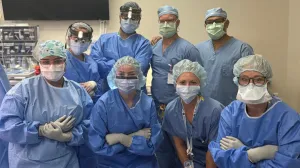
When United States Surgeon General Dr. Vivek Murthy released his Surgeon General’s Advisory on Alcohol and Cancer Risk in early January, it prompted a number of questions and a lot of conversation.
“We’ve known for some time that alcohol consumption has an association with increased risk of several types of cancers,” said Anubha Bharthuar, MD, a medical oncologist Tufts Medicine Cancer Center – Stoneham. “The Surgeon General’s advisory connects many of the dots with evidence and data collected over many years. The bottom line is that the risk of developing cancer may start to increase with consumption of one or fewer drinks (regardless of the type of alcohol) per day.”
The report notes that alcohol consumption is the third leading preventable cause of cancer in the US, behind tobacco and obesity. It goes on to state that alcohol is responsible for about 100,000 cases of cancer and 20,000 cancer deaths annually.
What are the takeaways?
According to Phillip Gray, MD, Chief of Radiation Oncology at MelroseWakefield Hospital, there are not many surprises in the report. “The risk is very real, and the reality is that although the risk increases with the amount of alcohol consumed, there is probably no safe dose of alcohol when it comes to cancer risk.”
That risk is even more concerning for women, where 16.4% of breast cancers can be attributed to alcohol consumption.
Should I stop drinking alcohol completely?
“It is important to understand the risk,” said Dr. Gray, who recommends a tapered approach for moderate drinkers. “Many people are trying a ‘dry January’ and this may be a good starting point to try reducing your alcohol consumption to see how you feel. You may find yourself feeling better and more productive, which is a win/win situation.”
“Your primary care physician can be a great partner in your decision to abstain or not,” said Dr. Bharthuar. “It has always been important to keep drinking alcohol from being part of your regular routine,” she advises, “but now, with this better understanding of the cancer risks increase with regular drinking, it is more important than ever.”
I’ve heard that drinking wine was good for me
According to Dr. Gray, over the years there have been proponents of drinking small amounts of alcohol to promote heart health. “Although there may be some advantages to drinking small amounts of red wine seen in some studies, the relative risks of developing cancer potentially outweigh those benefits,” he said.
What next?
The Surgeon General’s advisory is calling for more education, directly from the medical field and also through an upcoming national campaign. It is also being suggested for alcohol containers to expand the current warning to include cancer risk. “Education is very important right now, as many Americans are not aware of these risks,” said Dr. Gray. “Using common sense, understanding the risks and discussing your own situation with your physician are the best things you can do.”


